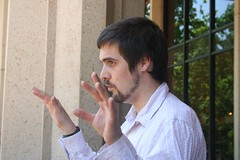there's always a mischevious disconnect between what you think you're teaching people, and what they actually value and acquire. however, sometimes they surprise you by hitting a home run in the area of things that are "actually important," despite an unimpressive batting average in all the other crap. the following post (which has turned out to be part of a three-part student-focus postgasm [re: this post, "To Whom it May Concern," and "Statement of Incident"]) is a list of excerpts from my caculus class's response to the question: "To what degree is our entire experience of mathematical truth - as it relates to concrete reality - an issue of dealing with limits?" this question appeared on an intro to limits test, and referenced a discussion we had on plato's allegory of the cave - which i used as a jumping-off-point to talk about the conceptual attractiveness of the mathematical limit.
"As in life and mathematics, nothing in life is what it seems. Something might have the characteristics of a certain thing, but it will never be a perfect shape or form. There will always be some minor, microscopic flaws that enable anything to be perfect [sic]. For instance, a hoop earring is said to be a circular object, but if you looked close enough you'll see tiny ridges and imperfections that couldn't make it a perfect circle. Another example is that this very paper is considered to be a rectangle, but it's not because its sides aren't perfect 90-degree angles."
"Limits have everything to do with mathematical truth. As we sit in class grasping concepts of a line or a circle and how perfect they are or the can be the reality of it is that we'd never find the perfect line. A line as we know it is not a line. A line is defined by having no depth or width, but in order for us to see a line without imagining it gives it width [sic]. Really everything is imaginary and what's real is fake."
"Philosophy says that everything we were taught is to be a lie [sic]. I believe [sic] this six years ago. Although if you think about it long enough everything will still be the truth... We believe only what is taught and have no proof. For if we were to search, ordinary people like us has [sic] made things up but we still are advised to believe what is taught no matter what."
"Our Mathematical truth to me really is no truth. The truth of all things doesn't ever exist it is just an allusion [sic] of all things. Nothing exists only just an example or explanation of them exists. We could draw straight lines all day long but actually we'll never reach the point of drawing a 100% straight line. The reason is because of the line is never precise it always has crooked and rough edges [sic]. The smallest edge or defect in the line makes it not a line."
"It's all a lie! You can never achieve a perfect circle or a perfect line or a perfect everything for that matter. Because no matter what, there will always be falacies in the construction so it could be said that the limit to the function of reality is perfection!"
"real world" my ass [re: "Statement of Incident" sidenote].
the twit
2.26.2006
Subscribe to:
Post Comments (Atom)

1 comment:
Your students are amazing.
P.S. I got your voice mail. Thanks. I'll certainly include it as one when I examine my options.
Post a Comment